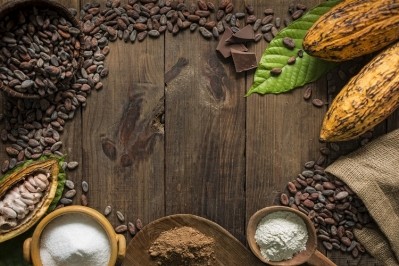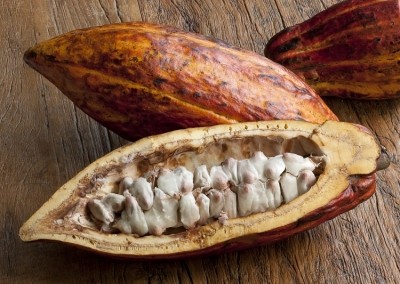Six start-ups rethinking cocoa for alt choc innovation

It’s not a good time to be a chocolate manufacturer. For one, recording-breaking cocoa prices continue to plague the sector - not so long ago, cocoa was fetching an eyewatering $10,760 (€10,039) per metric tonne.
And that’s not all. Cocoa is also on the European Union’s hitlist of deforestation-risk commodities, as a significant driver of forest loss in primary producing countries Côte d’Ivoire and Ghana.
Along with soy, beef, palm oil, wood, coffee and rubber, cocoa will soon come under the European Deforestation Regulation (EUDR) when it’s enforced in December this year. Since the new law affects all companies importing cocoa into the bloc, all major European chocolate makers will be impacted.
Deforestation aside, other irresponsible practices hang heavy on the sector. Forced labour has long been associated with cocoa production, contributing to even lower sustainability credentials.
Amid soaring prices, deforestation regulations, and unsustainable practices, chocolate makers may well be tempted to give cocoa alternatives a try. Which cocoa-free (or ‘tree-free’) innovations are promising to do everything cocoa can, and more?
We round up six start-ups rethinking cocoa with sustainability in mind.
Planet A Foods taps oats and sunflower seeds
Who would have thought that store-cupboard ingredients oats and sunflower seeds could be transformed into a cocoa-free chocolate?
In Germany, brother-sister duo Dr Maximilian and Sara Marquart are doing just that, with the aim of easing pressures on cocoa supply chains. Their start-up Planet A Foods already has a cocoa-free concentrate and butter on the market, which when used together creates cocoa-free

chocolate.
Sold under the ChoVivia brand, the final product is made with a minimum of 20% oats and sunflower seeds, ‘sustainable’ plant-based fats, sugar, and milk powder (or oat flour for the vegan version). The co-founders describe ChoViva as having a ‘delicious aroma’ and ‘luxurious snap’ – all with 90% less CO2 emissions than conventional chocolate.
“We ferment and roast oats in a special way,” Dr Marquart told FoodNavigator in an interview. “That’s a proprietary technology that my sister Sara developed. She has developed technology that converts oats into something that tastes like cocoa.”
Planet A Foods is invested in local processing, fermentation and roasting – meaning it all takes place at its own facilities, close to its customers.
The start-up’s ChoViva is already on the market in Germany, where shoppers can find it incorporated into biscuits, peanut butter cups, granola products, and even packets of Lindt vegan ‘chocolate’.
Voyage Foods replaces cocoa with upcycled grape seeds
On the other side of the pond, Voyage Foods has also been rethinking chocolate with different raw materials in mind.
Although the US-based start-up doesn’t limit itself to the chocolate category – Voyage Foods also makes coffee-free coffee and nut-free spread – it is invested in making cocoa-and dairy-free ‘milk’ and semi-sweet chocolate products.

The company’s cocoa-free chocolate uses upcycled grape seeds from postharvest wine production, which it combines with vegetable oil, cane sugar, sunflower protein flour, natural flavours, sunflower lecithin and salt.
For example, the company’s cocoa-free chocolate replaces cocoa seeds with upcycled grape seeds from postharvest wine production that are combined with vegetable oil, cane sugar, sunflower protein flour, natural flavours, sunflower lecithin and salt.
“It’s all very clean label,” co-founder and CEO Adam Maxwell told our sister publication FoodNavigator-USA. “These are innocuous ingredients, whole ingredients that people understand…but what is special about Voyage is really the transformation of these low or no value materials.”
As to Voyage Foods’ sustainability credentials, according to ESG consumption firm Sphera, the company’s chocolate alternatives use 99% less blue water, generate 81-84% less greenhouse gases, and are associated with 68-88% fewer greenhouse gas emissions from land use change.
In big news for the start-up, agrifood major Cargill recently announced a new commercial partnership with Voyage Foods to produce alternatives to cocoa-based products and nut spreads without using cocoa, peanuts or hazelnuts.
The ‘best way’ to solve human and environmental health challenges through food is to supply the world’s food brands and manufacturers with Voyage Foods’ ingredients, said Maxwell. “Partnering with Cargill…is the perfect way to scale these solutions globally to offer food manufacturers the ability to integrate cocoa-free confectionery and spreads produced with no nut or dairy allergens used in the recipe formulation, into their portfolios.”
Nukoko makes cocoa-free chocolate from faba beans
Unlike some alt choc innovators who rely on multiple ingredients to recreate cocoa, UK-based start-up Nukoko is focused on one raw material – and an unlikely one at that.
The faba bean – otherwise known as fava or broad bean – is widely cultivated in Europe and the UK. That’s attractive to Nukoko, since it automatically means it’s free from tropical deforestation and significant transport emissions.
Faba could also be considered something of a ‘relative’ to cocoa, since like cocoa beans, faba contains a seed storage protein known as vicilin.
“When that vicilin is broken down, and the peptides roasted, you get chocolatey flavours,” explained plant scientist and Nukoko co-founder Dr David Salt at Forward Fooding’s food tech event in London.
Dr Salt, who set up Nukoko alongside co-founders Ross Newton and Kit Tomlinson, believes that by using a controlled fermentation and drying process, before being roasted and ground into powder, the start-up can create a product with the potential to be cheaper than mass market chocolate when produced at scale.
Indeed, that’s Nukoko’s target market. Instead of competing with high-end chocolate, the start-up wants to focus solely on supplying its cocoa-free offerings to makers of bulk, product chocolate.
Although Nukoko is starting its journey with faba, the bean is not the only one with alt chocolate potential, Dr Salt revealed. “We’ve looked at the gene sequences of a whole bunch of beans and compared the vicilin in them. I would say that faba is definitely not the beginning or end of this story.”
Celleste Bio makes ‘tree-free’ cocoa butter and powder
Cell cultivation is not new to the food sector. The concept of lab-grown meat or cell-based dairy is becoming increasingly commonplace on the food tech scene, but what about cell cultivated cocoa?
Unlike many alternative cocoa creations, cell cultivated cocoa is not technically cocoa-free. In Israel, Celleste Bio is developing tree-free, real

100% cocoa butter and powder, and for that reason, contends it shouldn’t be considered an ‘alternative’.
To make cultivated cocoa butter and powder, the start-up takes a couple of beans from a cocoa pod, extracts the cells responsible for producing cocoa, and grows them with water, sugar and vitamins for nourishment.
With just those one or two beans, a continuous cycle can be created that repeats itself in a controlled setting, a company spokesperson explained. No additional beans are required, and no trees need be cut down.
According to Celleste Bio’s calculations, just one cell and one bioreactor can replace 10,000 square-metres of cocoa plantations and yield two tonnes of cocoa per year – the equivalent of 1,736 trees which take between four and seven years to grow.
The company is leveraging artificial intelligence computation to enhance cocoa customisation for chocolate manufacturers’ end-product specifications to optimise consistency and supply. The start-up also suspects that AI will help reduce costs related to formulation trials and waste.
“The process mimics the natural habitat of cocoa farming without the unpredictability, volatility and compromises,” we were told.
Celleste Bio is already turning heads, attracting investment from snacks and confectionery major Mondelēz International. The start-up has the potential to improve sustainability and reduce the cost of cocoa, Richie Gray, global head of Mondelēz’s corporate venture arm SnackFutures Ventures, told FoodNavigator. “We’ll continue to monitor and work in the regulatory landscape associated with that one.”
Foreverland champions forgotten crops and locally sourced ingredients
The Mediterranean is not known for its chocolate production, but Southern Italian start-up Foreverland is working hard to change this image.
The company’s four founders – Massimo Sabatini, Giuseppe D’Alessandro,
Riccardo Bottiroli, and Massimo Brochetta – are on a mission to overcome the ‘darker side’ of chocolate. “Chocolate, one of the world’s most beloved treats, often conceals a darker side to its production,” said CTO Bottiroli. Not only is the cocoa industry responsible for much deforestation but is also linked to forced labour.
Foreverland is rethinking chocolate with a focus on forgotten crops, upcycled food and locally sourced ingredients. The start-up’s cocoa-free chocolate products, which it markets under the name Freecao, is made from forgotten crop carob alongside a blend of different grains, sugar and vegetable fats.
“We’ve used a combination of traditional and patented innovative technologies to achieve the taste and texture of chocolate without cocoa.”
Compared to conventional chocolate, it boasts a significantly lower environmental footprint – using 90% less water and being associated with 80% fewer CO2 emissions.
Win-Win turns to carob and barley for alt choc creations
It was a warm day when FoodNavigator visited Win-Win on a site visit last year. Sun was streaming through the windows of the London-based start-up’s trendy East End office space, but without any threat of melting its cocoa-free innovations; the R&D lab is strategically located in the basement.
That’s where Win-Win’s head of chocolate Jon Hogan has full reign.
Founded in 2020 by Arhum Pak and Dr Johnny Drain, Win-Win makes cocoa-free chocolate alternatives made from barley and carob – but with conventional chocolate making equipment. Once these raw materials are fermented, the processing stage begins. “We mix these raw materials with fat and sugar,” Hogan explained, surrounded by mixers and chocolate moulds.
In June last year, the start-up was predominantly using Ghanian shea butter as its fat of choice, but was continuing to experiment with a variety of ingredients. On the day we visited the lab, and algae-based fat was being tested.
Once the ingredients are combined, Hogan sets about refining their particles for the ‘best flavour release’. The chocolate is then tempered for snap and ‘meltability’, co-founder Dr Drain explained. “You want it to melt at body temperature.”
Concerning taste and flavour, Win-Win is confident it’s achieved the archetypal bitterness associated with dark chocolate, as well as its ‘fruity acidity’. “We have red berries, prunes, notes of butterscotch in the long finish and maltiness coming through from the barley,” Dr Drain told FoodNavigator. “It’s a flavour profile that is very similar to that of premium dark chocolate: lots of acidity, brightness, complexity, and bitterness.”
Earlier this year, Win-Win underwent a subtle name change (Win-Win was previously branded WNWN, standing for ‘waste not, want not’). Under this new trade name, the start-up sells its cocoa-free chocolate alternative in wholesale packs to bakeries, foodservice operators, and the confectionery sector.




























